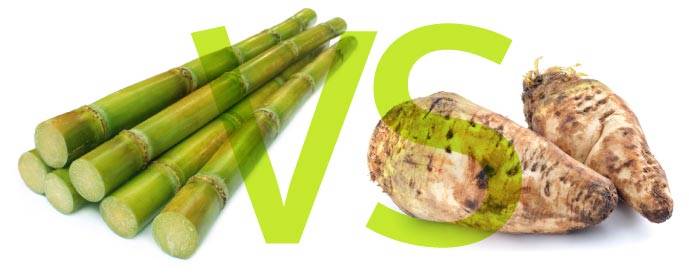Cane Sugar Processing: From Area to Table-- A Step-by-Step Guide
Cane Sugar Processing: From Area to Table-- A Step-by-Step Guide
Blog Article
A Comprehensive Summary of the Health And Wellness and Economic Effects of Walking Stick Sugar Handling on Local Neighborhoods
Walking cane sugar handling plays an essential role in shaping the economic landscape of regional areas, providing work opportunities and boosting ancillary industries. The wellness implications connected with high sugar consumption can not be neglected, as they add to climbing rates of obesity and diabetic issues.
Economic Advantages of Cane Sugar Processing
Cane sugar processing provides significant financial benefits that extend past the prompt farming industry. The cultivation and handling of sugarcane produce numerous work chances, from farming to manufacturing and circulation. This work generation not just sustains regional economic climates however likewise fosters area advancement by supplying secure revenue resources for family members.
Additionally, the sugar market stimulates secondary businesses, including transportation, devices supply, and product packaging solutions (Cane Sugar Processing). As these markets expand, they add to an extra robust economic structure, boosting total neighborhood resilience. The export capacity of processed walking cane sugar further enhances financial advantages, positioning areas as competitive gamers in worldwide markets
Financial investment in contemporary processing facilities can lead to enhanced efficiency and effectiveness, consequently reducing waste and enhancing source usage. This shift not only benefits the regional economic climate yet likewise supports sustainability initiatives by lessening environmental impacts.
Moreover, the earnings created from walking stick sugar handling can be reinvested in regional infrastructure, education and learning, and healthcare, advertising all natural neighborhood growth. In general, the economic advantages of walking stick sugar processing are complex, offering a structure for sustaining success in agricultural regions.
Wellness Risks Related To Sugar Intake
Too much sugar usage presents significant wellness risks that necessitate severe interest. High consumption of sugarcoated, especially from processed drinks and foods, has been linked to many health issues. One of one of the most pressing issues is obesity, as sugary diet plans add to a boosted calorie consumption without offering important nutrients. This extra can result in metabolic conditions, including type 2 diabetes mellitus, which has become significantly widespread in both grownups and children - Cane Sugar Processing.
Furthermore, high sugar consumption is related to heart disease. Raised blood sugar degrees can lead to insulin resistance, a precursor to numerous heart-related concerns. In addition, sugar can have damaging impacts on dental wellness, resulting in tooth cavities and gum condition, as microorganisms in the mouth flourish on sugar, creating acids that deteriorate tooth enamel.
Additionally, arising study suggests a potential link between high sugar usage and mental health disorders, such as anxiety and stress and anxiety. As communities come to grips with these health and wellness dangers, it becomes vital to advertise recognition and encourage healthier nutritional choices. Addressing sugar intake is vital not just for specific health and wellness but likewise for the general health of local communities, highlighting the need for detailed public health techniques.
Environmental Impacts of Sugar Manufacturing
Regularly overlooked in discussions regarding sugar's effects is the considerable ecological impact of sugar production. The farming of sugarcane frequently demands comprehensive land use, bring about logging, loss of biodiversity, and disturbance of regional environments. The conversion of forests and marshes right into sugar plantations can lead to environment devastation, threatening various types and altering ecological equilibrium.
Furthermore, sugar manufacturing is resource-intensive, consuming significant quantities of water for irrigation. This can result in depletion of local water resources, negatively impacting both farming techniques and neighborhood access to clean water. Furthermore, using chemical fertilizers and pesticides in sugarcane farming can contribute to soil deterioration and water air pollution, as runoff from these chemicals goes into close-by rivers and lakes, influencing marine life and human health.
The environmental footprint expands to the processing stage, where power consumption and waste generation additional intensify ecological problems. Air contamination from burning sugarcane areas, along with greenhouse gas emissions, add to environment modification. As such, the environmental effects of sugar production warrant serious factor to consider, prompting stakeholders to adopt even more sustainable practices to minimize these damaging results on local ecosystems and areas.
Task Creation and Area Development
The environmental challenges positioned by sugar manufacturing are often counterbalanced by its possibility for economic advantages, specifically in task creation and neighborhood growth. The walking stick sugar market functions as a considerable resource of employment in many backwoods, providing tasks across different ability degrees, from agricultural labor to processing and distribution roles. This employment not only sustains private households but additionally adds to the general financial vitality of regional neighborhoods.
Additionally, the facility of sugar processing centers stimulates ancillary companies, such as transport solutions, tools supply, and upkeep service providers. As these organizations thrive, they develop additional jobs and reinforce local economic situations. The revenue created from the sugar industry also results in boosted tax revenues, which can be reinvested into social work such as education, healthcare, and framework advancement.
Additionally, the sugar industry frequently participates in area growth campaigns, such as supporting regional institutions and health and wellness programs, thus improving the high quality of life for locals. By cultivating solid community ties and promoting economic development, the cane sugar processing industry plays a vital role in uplifting regional populations, making it an important element of lasting growth techniques in sugar-producing areas.
Harmonizing Wellness and Economic Development
In navigating the complexities of walking stick sugar processing, a critical obstacle hinges on balancing wellness factors to consider with economic growth. The sugar market substantially adds to local economic situations by generating work, promoting related fields, and increasing tax earnings. However, the health implications connected with excessive sugar consumption can cause persistent conditions such as weight problems, diabetes mellitus, and cardio issues, which can burden public health systems and diminish workforce efficiency.

Moreover, regulative structures can play a pivotal role in guiding sector techniques in the direction of even more health-conscious and lasting strategies. By promoting collaboration between federal government bodies, health and wellness organizations, and the sugar sector, communities can navigate the dichotomy of health and economic development, making sure that the benefits of walking stick sugar handling are equitably shared while prioritizing public look here health.
Final Thought
Finally, the processing of walking cane sugar provides both considerable economic advantages and noteworthy health and wellness risks for neighborhood areas. While it promotes task creation and stimulates regional growth, the connected health and wellness problems, particularly pertaining to weight problems and diabetes mellitus, demand a mindful balancing act. By advertising responsible usage and investing in community education and lasting methods, it is possible to maximize economic benefits while minimizing negative wellness impacts, consequently ensuring a healthier future for regional populaces.
In addition, sugar can have detrimental results on oral health, resulting in tooth cavities and gum disease, as microorganisms in the mouth grow on sugar, generating acids that wear down tooth enamel.
Addressing sugar intake is essential not only for specific wellness however also for the overall wellness of local neighborhoods, emphasizing the requirement for detailed public health strategies.
Frequently overlooked in conversations concerning sugar's implications is the substantial environmental effect of sugar production. The health ramifications linked with too much sugar consumption can lead to persistent conditions such as excessive weight, diabetes mellitus, and cardio concerns, which can concern public health systems and reduce workforce productivity.

Report this page